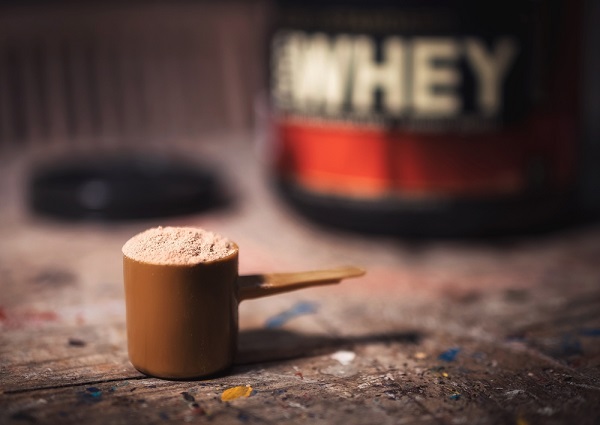Dry Scooping – A Dangerous Fitness Trend Among Teens

Why are young athletes suddenly ‘dry scooping’? Our exclusive interviews tell more.
“Mmmm…isn’t this yummy? It’s that great new dietary powder I found. You know…the one that gives me extra protein—or something I need. I mean, I saw it being used online. And it’s got millions of viewers. So this has to be OK, right?”
The above are not actual quotes. But they could be what millions of younger athletes, especially teens, are saying as they discover a new trend in ingesting pre-workout supplemental powders. The trend: “dry scooping” i.e. simply gulping down powder-filled scoops rather than fully liquifying them.
News has exploded about this trend and its dangers, provided in an abstract at this year’s American Academy of Pediatrics conference. The lead author, Nelson Chow, is an intern in Developmental and Behavioral Pediatrics Research at Cohen Children’s Medical Center in New Hyde Park, NY. As his study notes, “Despite being labeled [for ages] 18+, pre-workout has become increasingly popular among teens.”
It’s about a new focus
“Cohen Children’s Medical Center realized that we [their interns] can offer our unique awareness of, and insight into, so-called ‘Teen Trends.’ These are concerning, dangerous, even deadly trends that pop up on social media,” Chow tells Athletech News in an exclusive interview.
“Our team has found that younger researchers can be more familiar with social media…because of their own use of these platforms,” says Ruth Milanaik, DO, a pediatrician and major researcher at NYC’s Northwell Health, the parent company of Cohen Children’s.
Speaking with Athletech News, she adds, “This type of innovative approach has led to several other studies on dangerous trends [younger reviewers see], including [what’s written in] an award-winning abstract in the AAP’s Council on Child Abuse and Neglect.”
Study’s dire insights
Chow reviewed 100 TikTok videos carrying the #preworkout hashtag and found that a frightening number of people “liked” dangerous behaviors—over 12 million in total that he reviewed.
Specifically, Chow found that the majority of those in the TikTok study—over eight million—liked dry scooping, but close to 2.5 million likes were on postings that “featured users improperly concentrating/mixing pre-workout,” (especially alcohol and energy drinks) and another 1.7 million likes “featured users consuming pre-workout through other dangerous methods,” including creatine/protein powders.
While the abstract doesn’t cite the ages of those Chow studied, he does point out that TikTok is “a platform with millions of teenage users.”
Screen time can generate negative behaviors
Chow’s study is of course one of the growing number tracking everyone’s ability to access all types of “information” with today’s technology. And unfortunately in so many cases, that information is totally unbiased and/or undocumented.
As he points out in his abstract: “On TikTok, dangerous methods of consuming pre-workout were found to be extremely prevalent.” Of all the postings Chow studied, “only 8% of videos depicted use according to instructions.”
“Given that TikTok has hundreds of millions of adolescent viewers, children may be constantly exposed to influencers who are dry scooping pre-workout powder. They may be easily misled by fitness influencers and other TikTok viewers to believe that dry scooping is the ‘correct’ and ‘trendy’ way to consume pre-workout,” says Milanaik.
Chow’s research melds with much already out about other dangers social media can bring teens. The Mayo Clinic’s site has a section that offers several warnings. One, a study of over six thousand 13- to 16-year-olds in 2019, found “that those who spent more than three hours a day using social media might be at heightened risk for mental health problems.”
Warnings are not just domestic
Concerns over the dangers that Chow’s abstract offers are not confined to the U.S. In England, pick-up stories of his review present warnings from their own healthcare experts.
The Daily Mail reported that nutrition scientist Bridget Benelam told the BBC, “Pre-workout powders typically contain caffeine along with other ingredients such as creatine, amino acids and vitamins.” (The Mail and others note that Benelam “is from the British Nutrition Foundation [and] was not involved with the study.”)
She added, “There is a risk of over-consuming caffeine, especially if using more than once a day, or just consuming the powder, where you may consume more than the recommended amount.”
Understanding recommendations
In the U.S., our FDA’s recommended daily intake of caffeine is 400 mg. “The Cleveland Clinic says that most brands of pre-workout contain 150-300 mg of caffeine per serving, and some brands can contain up to 500 mg of caffeine according to manufacturer labels. Given that a typical cup of coffee contains [around] 95 mg of caffeine, a person could be consuming the equivalent of 3-5 cups of coffee in one sitting. [That’s] a high amount [of caffeine] for people of any age,” Milanaik points out.
Among the dangers of excess caffeine are “insomnia, nervousness [and]…increased heart rate.” One of the online health questions on the website of the Providence St. Vincent Heart Clinic says these symptoms are part of a mental health disorder labeled “caffeine intoxication,” and that other symptoms include “increased gastric acid, bowel irritability, and panic attacks.”
“Elevated caffeine intake in children can lead to [an] increase in blood pressure and cardiac rhythm disturbances, which may or may not be felt. Moreover, caffeine is not generally recommended by physicians for child use, as it can stunt growth, affect moods, [and] cause sleep disturbances,” says Milanaik.
And Chow adds that his group’s study noted other dangers beyond “caffeine overconsumption.” As he told us, “There is also concern…about other potentially dangerous substances in pre-workout powders, like DMAA.”
Overall, Chow’s abstract notes that “impressionable minors” could face truly dire results from their “improper use,” of these dry powders, including “choking,” and “respiratory or cardiovascular distress and/or death.”
It’s critical to watch warning signs
“Pre-workout powder is not necessary for children to consume,” Milanaik notes, adding, “Parents who know that their child is interested in fitness, weight training, or any forms of exercise—and especially parents of student athletes—should have open conversations with their children regarding the risks of dry scooping and pre-workout powder use. [That includes talking] about the dangers of high caffeine and supplement consumption at a young age and the risk of choking from dry scooping.
“Parents may also seek out a registered dietitian for advice on nutrition and supplements for their child. Coaches and athletic trainers should warn young athletes about the risks of pre-workout consumption and also monitor the use of pre-workout powder among athletes during training sessions,” Milanaik concludes.
Though based in Baltimore, MD, Wendy J. Meyeroff has been an internationally published reporter on health, fitness, and tech for both B2B and B2C audiences for over 20 years. Among her collaborations are CBS (launching it’s consumer health site), Senior Wire News Syndicate, Vision Industry Council of America, Healthcare Informatics, Good Housekeeping and Weight Watchers.



